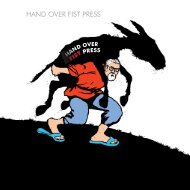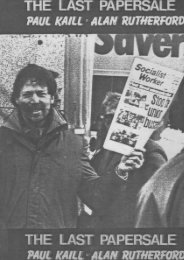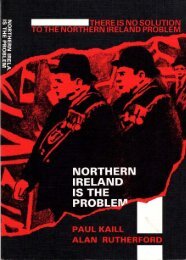- Page 1:
HAND OVER FIST PRESS SHEEP IN THE R
- Page 5 and 6:
This Volume’s CONTENTS ----------
- Page 7 and 8:
ANOTHER OPENING -------------------
- Page 9:
HAND OVER FIST PRESS SHEEP IN THE R
- Page 12 and 13:
SHEEP IN THE ROAD : NUMBER TEN
- Page 14 and 15:
2 SHEEP IN THE ROAD : NUMBER TEN
- Page 16 and 17:
DMITRY- MOOR DMITRY MOOR BOLSHEVIK
- Page 18 and 19:
The black-and-white ink drawing, wh
- Page 21 and 22:
In 1928-1932 he was a member of the
- Page 23 and 24:
THE CRIME OF WAR An excerpt - Wilfr
- Page 25 and 26:
ook ExcERpt 13 MAY DAY 2016
- Page 27 and 28:
15 MAY DAY 2016
- Page 29 and 30:
ook ExcERpt September 2013 | coldty
- Page 31 and 32:
19 September 2013 | coldtype 27 MAY
- Page 33 and 34:
US ELECTIONS: BEFORE BERNIE SANDERS
- Page 35 and 36:
He ran again in 1904 (gaining 3 per
- Page 37 and 38:
Women garment workers on strike in
- Page 39 and 40:
27 MAY DAY 2016
- Page 41 and 42: ARSEHOLES -------------------------
- Page 43 and 44: I’ve seen aggressive and deceitfu
- Page 45 and 46: I think the State in any civilised
- Page 47: 35 MAY DAY 2016
- Page 50: In 1963 one of Lorenz’s colleague
- Page 53 and 54: SOCIAL EXPERIMENT IN LEEDS --------
- Page 55 and 56: Other inclusions were to have been
- Page 57 and 58: MEMENTO MORI P e t e r M i t c h e
- Page 59 and 60: 47 MAY DAY 2016
- Page 61 and 62: Not surprisingly the entire city wa
- Page 63 and 64: Today we see tens of thousands of a
- Page 65 and 66: 53 MAY DAY 2016
- Page 67 and 68: ‘It is Right to Rebel’ song and
- Page 69 and 70: Photograph: Li Zhensheng A particul
- Page 71 and 72: Wu Bingyuan (eyes closed) with Wang
- Page 73 and 74: 61 MAY DAY 2016
- Page 75 and 76: 63 MAY DAY 2016
- Page 77 and 78: WRITING ---------------------------
- Page 79 and 80: 67 MAY DAY 2016
- Page 81 and 82: WAFFLE ----------------------------
- Page 83 and 84: SHEEP IN THE ROAD ELEVEN the europe
- Page 85 and 86: The CONTENTS ----------------------
- Page 87 and 88: OPENING ---------------------------
- Page 89 and 90: DAMN & BORDERATION! How Isis thrive
- Page 91: In my own reporting of the uprising
- Page 95 and 96: THAT CHILCOT MOMENT 11 June 2016
- Page 97 and 98: Taken from STUMBLING AND MUMBLING:
- Page 99 and 100: 15 June 2016
- Page 101 and 102: ILLUSIONS of Democracy 23 JUNE It w
- Page 103 and 104: when you are told there are 70 mill
- Page 105 and 106: 21 Artwork from Nye Wright’s sket
- Page 107 and 108: 23 June 2016
- Page 109 and 110: 25 Photographs: Alan Rutherford TEW
- Page 111 and 112: 27 June 2016
- Page 113 and 114: 29 June 2016
- Page 115 and 116: 31 June 2016
- Page 117 and 118: 33 June 2016
- Page 119 and 120: 35 June 2016
- Page 121 and 122: 37 June 2016
- Page 123 and 124: CETC ETC ETC 39 June 2016
- Page 125 and 126: SHEEP IN THE ROAD 41 INTENDED AS A
- Page 127 and 128: Abahlali baseMjondolo is a movement
- Page 129 and 130: A HOMEMADE POLITICS Abahlali baseMj
- Page 131 and 132: sustained its autonomy from politic
- Page 133 and 134: to make it almost impossible to ben
- Page 135 and 136: DENIS BECKETT WHITE MAN WALKING 51
- Page 137 and 138: RAGS TO RICHES BY FEEDING THE KILLI
- Page 139 and 140: 55 The Electro Voice T45 Noise-canc
- Page 141 and 142: Socialist Worker Letters Page Dear
- Page 143 and 144:
59 June 2016
- Page 145 and 146:
Jailed in las vegas | Brian terrell
- Page 147 and 148:
WAFFLE ----------------------------
- Page 149 and 150:
SHEEP IN THE ROAD TWELVE IN OR OUT
- Page 151 and 152:
The CONTENTS ----------------------
- Page 153 and 154:
OPENING ---------------------------
- Page 155 and 156:
WE ALREADY OWN IT I recently applie
- Page 157 and 158:
discontent, dissatisfaction and gre
- Page 159 and 160:
DRUM A photo-magazine that had edit
- Page 161 and 162:
Drum’s fortunes might have contin
- Page 163 and 164:
Tony Sutton, editor of South Africa
- Page 165 and 166:
mechanisms for self-expression will
- Page 167 and 168:
17 mid-June 2016
- Page 169 and 170:
TSOTSI ZUMA The employment of cunni
- Page 171 and 172:
21 Artwork: Alan Rutherford mid-Jun
- Page 173 and 174:
There are no ideas in Bristol only
- Page 175 and 176:
Paul RENNER 1876-1956 Typeface FUTU
- Page 177 and 178:
WORDS AS TURDS REFERENDUM INNUENDUM
- Page 179 and 180:
Artwork: Alan Rutherford Socialist
- Page 181 and 182:
31 mid-June 2016
- Page 183 and 184:
WAFFLE ----------------------------
- Page 185 and 186:
SHEEP IN THE ROAD 13 JULY-AUGUST 20
- Page 187 and 188:
The CONTENTS ----------------------
- Page 189 and 190:
OPENING ---------------------------
- Page 191 and 192:
Artwork: John Phillips PFI If you t
- Page 193 and 194:
£ HSBC also has a controlling stak
- Page 195 and 196:
As a junior doctor, it mystifies me
- Page 197 and 198:
11 JULY & AUGUST 2016
- Page 199 and 200:
A bag of bones, blood, shit and pis
- Page 201 and 202:
HUMBER SUPER SNIPE: Did it really h
- Page 203 and 204:
‘If you guys will help me, maybe
- Page 205 and 206:
Increasingly the car was being danc
- Page 207 and 208:
TRUMP- CLINTON & MAY FACE THE WORLD
- Page 209 and 210:
So .... just when you thought you m
- Page 211 and 212:
NEGATIVE CREDIT, CULTURALLY … A w
- Page 213 and 214:
ut also the publisher has been appl
- Page 215 and 216:
29 JULY & AUGUST 2016
- Page 217 and 218:
31 JULY & AUGUST 2016
- Page 219 and 220:
33 Artwork: Alan Rutherford JULY &
- Page 221 and 222:
35 JULY & AUGUST 2016
- Page 223 and 224:
WAFFLE ----------------------------
- Page 225 and 226:
HAND OVER FIST PRESS SHEEP IN THE R
- Page 227 and 228:
Syria: Aleppo A horrific situation,
- Page 229 and 230:
The CONTENTS ----------------------
- Page 231 and 232:
OPENING ---------------------------
- Page 233 and 234:
Cultural THIEVERY Whilst plagiarism
- Page 235 and 236:
7 MID-AUGUST 2016
- Page 237 and 238:
Appropriating PEACE Why are some sy
- Page 239 and 240:
11 Artwork: Stephen Alcorn MID-AUGU
- Page 241 and 242:
THANK GOODNESS FOR GUTENBERG! When
- Page 243 and 244:
15 MID-AUGUST 2016
- Page 245 and 246:
Blairites still fuck with the machi
- Page 247 and 248:
Labour MP’s prepared to use membe
- Page 249 and 250:
We should watch out for this year
- Page 251 and 252:
23 MID-AUGUST 2016
- Page 253 and 254:
Iceland’s Pirate Party may form n
- Page 255 and 256:
Eva Heida Önnudóttir, a political
- Page 257 and 258:
29 MID-AUGUST 2016
- Page 259 and 260:
KISS “The purpose of the attack w
- Page 261 and 262:
33 MID-AUGUST 2016
- Page 263 and 264:
Chinese invest in the UK Everything
- Page 265 and 266:
37 MID-AUGUST 2016
- Page 267 and 268:
39 MID-AUGUST 2016
- Page 269 and 270:
and remember, capitalism does not w
- Page 271 and 272:
43 MID-AUGUST 2016
- Page 273 and 274:
WAFFLE ----------------------------
- Page 275 and 276:
HAND OVER FIST PRESS SHEEP IN THE R
- Page 277 and 278:
c SEPTEMBER 2016
- Page 279 and 280:
The CONTENTS ----------------------
- Page 281 and 282:
OPENING ---------------------------
- Page 283 and 284:
CORPORATE TOTALITARIANISM Aldous Hu
- Page 285 and 286:
Artwork: Alan Rutherford We’d lik
- Page 287 and 288:
GREAT ZIMBABWE Adapted form ‘Lost
- Page 289 and 290:
suggested it was built by Portugues
- Page 291 and 292:
13 SEPTEMBER 2016
- Page 293 and 294:
The last part of the ruins is the V
- Page 295 and 296:
Zimbabwe organisation - is now chal
- Page 297 and 298:
19 Artwork: Peter Kuper QED! SEPTEM
- Page 299 and 300:
HOW DID WE GET INTO THIS MESS?: POL
- Page 301 and 302:
CLUELESS Heading for the knackers y
- Page 303 and 304:
egime is a way of fulfilling that d
- Page 305 and 306:
BRITAIN ALWAYS ON THE LOOKOUT FOR A
- Page 307 and 308:
29 BY DISMISSING CONCERNS OF ARMS S
- Page 309 and 310:
31 SEPTEMBER 2016
- Page 311 and 312:
Cradle of Islam 33 SEPTEMBER 2016
- Page 313 and 314:
BRITAIN’S SECRET WARS For more th
- Page 315 and 316:
37 SEPTEMBER 2016
- Page 317 and 318:
The British were operating in accor
- Page 319 and 320:
In fact, between 1918 and 1939, Bri
- Page 321 and 322:
oil from the Persian Gulf makes its
- Page 323 and 324:
During the 1950s there were a numbe
- Page 325 and 326:
The British response was merciless.
- Page 327 and 328:
Strategically, the Dhofar war was o
- Page 329 and 330:
In the years since the Dhofar war,
- Page 331 and 332:
operation had cost £45m in the pre
- Page 333 and 334:
55 SEPTEMBER 2016
- Page 335 and 336:
57 TORY CARE BEARS SEPTEMBER 2016
- Page 337 and 338:
Artwork: Alan Rutherford DEAD SHEEP
- Page 339 and 340:
As a remainer I was shocked and ups
- Page 341 and 342:
well, YEAH, but its more of a conti
- Page 343 and 344:
THE POLICE STRIKE? 65 SEPTEMBER 201
- Page 345 and 346:
YEAH, capitalism certainly does not
- Page 347 and 348:
69 SEPTEMBER 2016
- Page 349 and 350:
WAFFLE ----------------------------
- Page 351 and 352:
HAND OVER FIST PRESS SHEEP IN THE R
- Page 353 and 354:
c October 2016
- Page 355 and 356:
The CONTENTS ----------------------
- Page 357 and 358:
OPENING ---------------------------
- Page 359 and 360:
‘An antidote to the far right’s
- Page 361 and 362:
Frances O’Grady. Every five years
- Page 363 and 364:
for Bengalis,’ he says. Brick Lan
- Page 365 and 366:
Back at the day centre, Beattie des
- Page 367 and 368:
MEN OF ENGLAND [& WOMEN] Men of Eng
- Page 369 and 370:
esist its attacks.....In this respe
- Page 371 and 372:
17 October 2016
- Page 373 and 374:
4. Abolition of property qualificat
- Page 375 and 376:
21 October 2016
- Page 377 and 378:
IGNORE THE PATRONISING NAYSAYERS, L
- Page 379 and 380:
The alternative is to treat people
- Page 381 and 382:
27 October 2016
- Page 383 and 384:
BUT, ARE WE ANTI-SEMITIC? 1. If you
- Page 385 and 386:
the same response as the one I was
- Page 387 and 388:
‘What an awful, warped piece of p
- Page 389 and 390:
SAVE THE FLOWERS! ‘These are the
- Page 391:
Artwork: Alan Hardman HOW CAN A POO
- Page 394 and 395:
40 SHEEP IN THE ROAD : NUMBER 16
- Page 396:
42 SHEEP IN THE ROAD : NUMBER 16
- Page 399 and 400:
UTH AFRICAN APARTHEID Anne Rearick:
- Page 402 and 403:
48 SHEEP IN THE ROAD : NUMBER 16
- Page 404 and 405:
of all of Banksy’s anti-establish
- Page 406 and 407:
The bill will allow the Government
- Page 408 and 409:
the elites are lying and that polit
- Page 410 and 411:
56 SHEEP IN THE ROAD : NUMBER 16
- Page 412 and 413:
58 Crickey ... a virtual keyboard,
- Page 414 and 415:
60 Writing worth reading Photos wor
- Page 416 and 417:
Artwork: still unknown 62 SHEEP IN
- Page 418 and 419:
HAND OVER FIST PRESS 2 0 1 6
- Page 420 and 421:
money money money
- Page 422 and 423:
d Sheep in the Road editor receives
- Page 424 and 425:
2 SHEEP IN THE ROAD : NUMBER 17
- Page 426 and 427:
ALBERT WOODFOX HERMAN WALLACE
- Page 428 and 429:
Woodfox and Wallace immediately beg
- Page 430 and 431:
8 ROBERT KING WILKERSON THE ANGOLA
- Page 432 and 433:
However, with the complexities of a
- Page 434 and 435:
12 SHEEP IN THE ROAD : NUMBER 17
- Page 436 and 437:
From village to village, such stori
- Page 438 and 439:
TAC drew attention to the relations
- Page 440 and 441:
18 SHEEP IN THE ROAD : NUMBER 17
- Page 442 and 443:
20 SHEEP IN THE ROAD : NUMBER 17
- Page 444 and 445:
REBELIOUS BADGES 1978-1986 22 SHEEP
- Page 446 and 447:
24 SHEEP IN THE ROAD : NUMBER 17
- Page 448 and 449:
26 SHEEP IN THE ROAD : NUMBER 17
- Page 450 and 451:
28 SHEEP IN THE ROAD : NUMBER 17
- Page 452 and 453:
30 SHEEP IN THE ROAD : NUMBER 17
- Page 454 and 455:
32 SHEEP IN THE ROAD : NUMBER 17
- Page 456 and 457:
34 SHEEP IN THE ROAD : NUMBER 17
- Page 458 and 459:
A Basic income will make benefit fr
- Page 460 and 461:
38 SHEEP IN THE ROAD : NUMBER 17
- Page 462 and 463:
40 SHEEP IN THE ROAD : NUMBER 17
- Page 464 and 465:
Another photograph shows a family c
- Page 466 and 467:
In trying to understand the migrant
- Page 468 and 469:
‘We were not equal to the rest of
- Page 470 and 471:
‘The president still continues to
- Page 472 and 473:
50 SHEEP IN THE ROAD : NUMBER 17
- Page 474 and 475:
52 THE NORMAN CONQUEST 2016 Deceit,
- Page 476 and 477:
TRUMP 54 SHEEP IN THE ROAD : NUMBER
- Page 478 and 479:
ight, the people have spoken, we’
- Page 480 and 481:
eferendum result has wrought, even
- Page 482 and 483:
60 SHEEP IN THE ROAD : NUMBER 17
- Page 484 and 485:
‘We wanted to put on display the
- Page 486 and 487:
A cartoon after the Jallianwala mas
- Page 488 and 489:
The lethal legacy Britain presented
- Page 490 and 491:
India wants access to the UK labour
- Page 492 and 493:
We want to remember British militar
- Page 494 and 495:
72 Crickey ... a virtual keyboard,
- Page 496 and 497:
74 Writing worth reading Photos wor
- Page 498 and 499:
Artwork: still unknown 76 SHEEP IN
- Page 500:
HAND OVER FIST PRESS 2 0 1 6

















